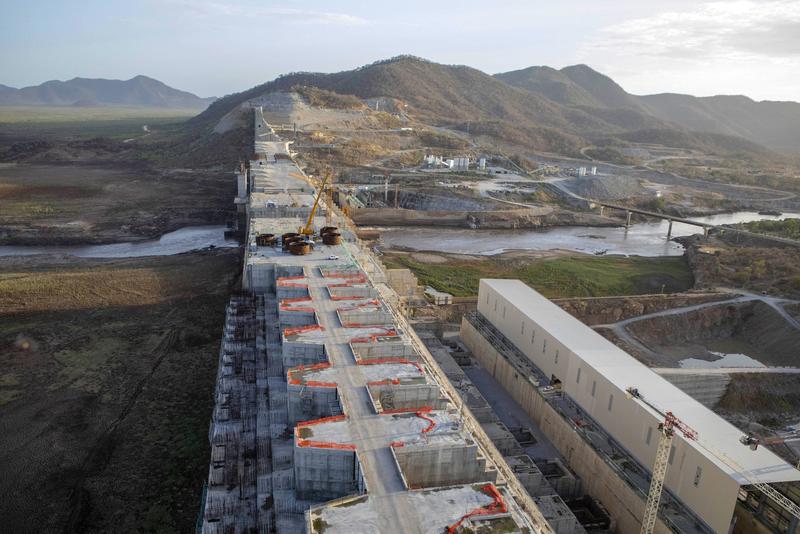 In this May 21, 2019 photo, construction machinery stands in the center of the dam wall at the site of the under-construction Grand Ethiopian Renaissance Dam in the Benishangul-Gumuz Region of Ethiopia. (ZACHARIAS ABUBEKER / BLOOMBERG)
In this May 21, 2019 photo, construction machinery stands in the center of the dam wall at the site of the under-construction Grand Ethiopian Renaissance Dam in the Benishangul-Gumuz Region of Ethiopia. (ZACHARIAS ABUBEKER / BLOOMBERG)
Egypt and Sudan condemned Ethiopia’s start of the second phase of filling a controversial Nile dam, warning the move violates existing agreements and threatens security in the region.
Ethiopia has argued the GERD project is key to its long-term development goals, and has sought to downplay concerns by Egypt and Sudan that the project will impact their access to water
The comments, in a statement from the Egyptian Foreign Ministry, came after the two countries said they’d been informed by Ethiopia that it resumed filling the Grand Ethiopian Renaissance Dam (GERD) - a project the two North African nations fear will curtail their access to a vital source of fresh water. Egypt is taking its case to the United Nations Security Council this week.
The step “represents a dangerous escalation that reveals Ethiopia’s bad faith,” Egypt’s Foreign Ministry said. The move violates international laws and norms and existing agreements on sharing Nile water, it said.
Ethiopia has argued the GERD project, which includes a 6,000-megawatt power plant, is key to its long-term development goals, and has sought to downplay concerns by Egypt and Sudan that the project will impact their access to water. It’s also remained largely intransigent in the face of efforts to involve outside help, rejecting a recent Egyptian-Sudanese proposal to add the UN, the US and the European Union as mediators.
ALSO READ: Sudan asks UNSC to meet over Ethiopia's Blue Nile dam
Sudan’s chief negotiator on the dam, Mustafa Hussein, confirmed Ethiopia had notified his government that the filling had commenced. “They sent a nonsense letter,” Hussein said by phone.
Calls to Ethiopian Water Minister Seleshi Bekele and Prime Minister Abiy Ahmed’s spokeswoman, Billene Seyoum, weren’t answered when Bloomberg sought comment.
Both Egypt and Sudan rely heavily on the Nile for fresh water. Cairo has been particularly bellicose in its objections, with President Abdel-Fattah El-Sisi warning earlier this year that any attempt to take “a drop of Egypt’s water” would have destabilizing effects on the region.
“Egypt showed flexibility in negotiating, which was met with great intransigence on the Ethiopian side, given that Ethiopia does not have the political will to reach an agreement,” the Egyptian statement said. It added that the UN was ready to work to support African Union-backed negotiations, if the three countries requested the help.


